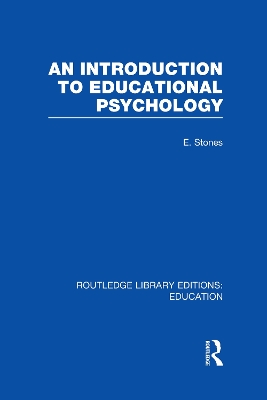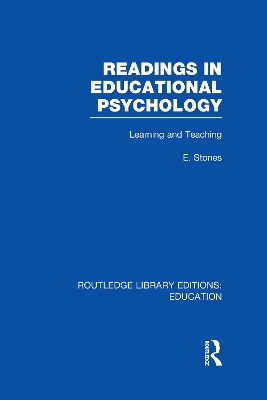Routledge Library Editions: Education
3 total works
This book introduces students of education to the elements of educational psychology. It also relates as closely as possible the findings of research to classroom practice. In order to make clear the fundamental processes involved in psychological development, the book starts with a study of the way in which the young child adapts its behaviour to its environment. This study considers some of the key aspects of physical development, mainly the central nervous system. At the same time the way physical growth and psychological development are influenced by the experience of the individual is also discussed. This discussion of development is followed by an examination of the processes of learning, with particular attention paid to the works of Piaget.
The salient points of each chapter are brought together in a summary which may be used by the reader to obtain a preliminary overview of the content of the chapter, and as an aid to revision.
Educational Objectives and the Teaching of Educational Psychology
by Edgar Stones
The purpose of this book is to promote discussion about educational objectives generally and objectives in the teaching of educational psychology in particular. To this end, Part 1 contains a review of the literature concerned with these two subjects, and also reports on investigations into the views of British students, teachers, college staffs and educational psychologists on the question of the objectives of educational psychology in teacher preparation. A comprehensive bibliography is provided. A further important section of Part 1 proposes a method of systematizing teaching objectives, and suggests a heuristic device for the generation of objectives at different levels of conceptual generality and complexity of learning. An example of this model in the field of educational psychology is presented, which illustrates the general approach to the generation of teaching objectives and proposes a specific approach to the production of teaching objectives in educational psychology. In Part 2 a selection of readings in the fields of objectives and educational psychology provides the reader with some of the key source material referred to in Part 1.
As well as being a valuable and stimulating addition to the current debate on the specifying of educational objectives, the arguments in this book about the role of educational psychology in teacher preparation raise some fundamental questions for those concerned with teacher education.
The papers in this volume relate to the nature and conditions of classroom learning, with particular emphasis on the cognitive aspects. They are concerned with the question of concept formation and stress the importance of the teacher's function in ensuring that the child really has assimilated the ideas and not merely the words for the concepts. The role of language is fundamental to this theme, and the interaction of language, thinking and learning is dealt with in the first section of the book. This section also provides a context within which subsequent discussions of classroom learning problems can be viewed. Some problems concerning the elaboration of a general theory of teaching are then examined with particular reference to possible methods of bridging the gap between research and implementation.


